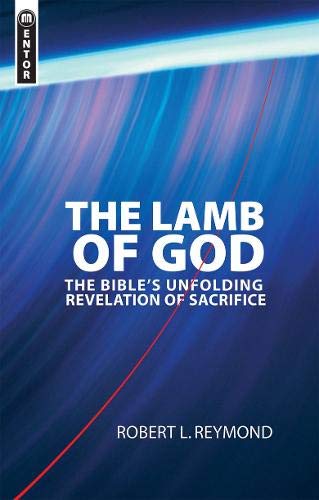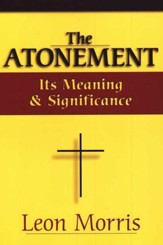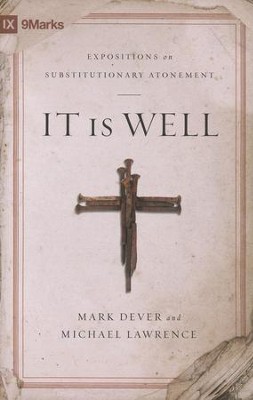Quotes about Jesus_Christ-Death-Expiation
Propitiation addresses the wrath of God. It is the work of Christ saving us from God’s wrath by absorbing it in His own person as our substitute. Expiation, which basically means “removal,” accompanies propitiation and speaks of the work of Christ in removing or putting away our sin. Such is the symbolism of the two goats used on the Day of Atonement. The first goat represented Christ’s work of propitiation as it was killed and its blood sprinkled on the mercy seat. The second goat represented Christ’s work of expiation in removing or blotting out the sins that were against us. The object of propitiation is the wrath of God. The object of expiation is the sin, which must be removed from His presence.
Copied from The Gospel for Real Life by Jerry Bridges, © 2002, p. 71-72. Used by permission of NavPress – www.navpress.com. All rights reserved. Get this book!
Our sins have been put away. To use the language of the Scriptures…they are completely removed, put behind God’s back, blotted out, remembered no more, and hurled into the depths of the sea.
Copied from The Gospel for Real Life by Jerry Bridges, © 2002, p. 69. Used by permission of NavPress – www.navpress.com. All rights reserved. Get this book!
The modern view of the death of Jesus is that He died for our sins out of sympathy. The New Testament view is that He bore our sin not by sympathy, but by identification. He was made to be sin. Our sins are removed because of the death of Jesus, and the explanation of His death is His obedience to His Father, not His sympathy with us. We are acceptable with God not because we have obeyed, or because we have promised to give up things, but because of the death of Christ, and in no other way. We say that Jesus Christ came to reveal the Fatherhood of God, the lovingkindness of God; the New Testament says He came to bear away the sin of the world.
An infinite sin deserves an infinite punishment because it receives its aggravation from the dignity of the person against whom it is committed. So the sufferings of Christ, though finite in regard of His human nature, received an infinite value from the infiniteness of His person, equivalent to the debts of all that come to Him. Sin is finite in regard to this subject, infinite in regard to the great God against whom it is. The sufferings of Christ are infinite in regard of the subject and infinitely please the Governor of the world unto whom the offering is made.
The wrong that man had done to the Divine Majesty, should be expiated by none but man, and could be by none but God.
A Puritan Golden Treasury, compiled by I.D.E. Thomas, by permission of Banner of Truth, Carlisle, PA. 2000, p. 30
God forgave sinners before Christ died. God forgives sinners since Christ died. But God forgives all sinners because Christ died.
The Final Passover, the First Communion. The sermon originally appeared at: (https://www.gty.org/library/sermons-library/42-269/the-final-passover-the-first-communion) at www.gty.org. © 1969-2008. Grace to You. All rights reserved. Used by Permission.
There is no death of sin without the death of Christ.
A Puritan Golden Treasury, compiled by I.D.E. Thomas, by permission of Banner of Truth, Carlisle, PA. 2000, p. 30.
The cross was the place on which this sacrifice was offered; for as the blood of the slain lamb was poured out at the foot of the altar, sprinkled upon its horns, and burned in its ever-enduring fire, so our blessed Lord shed His blood upon the cross. He there endured the wrath of God to the uttermost; He there put away sin by the sacrifice of Himself; He there offered His holy soul and body, the whole of His pure and sacred humanity, in union with his eternal Deity, as an expiation for the sins of His people.
The good news is that God Himself has decreed a way to satisfy the demands of His justice without condemning the whole human race. Hell is one way to settle accounts with sinners and uphold his justice. But there is another way. The wisdom of God has ordained a way for the love of God to deliver us from the wrath of God without compromising the justice of God. And what is this wisdom? The death of the Son of God for sinners!
Desiring God, Bethlehem Baptist Church, 1996, p. 59, Used by Permission, www.desiringGod.org. Get this book!
When we initially accepted Christ, we were saved from sin’s penalty. Christ received the full wrath for our sins on Himself. And the day will come when we step into glory that we will be saved from sin’s presence. Yet right now we briefly tarry on earth existing in the tension between the two worlds. God has given us grace to overcome sin and become more like Jesus Christ which shows the life transforming power of the Gospel at work in us. So, we have been saved from sin’s penalty. We are being saved from sin’s power. And we will be saved from sin’s presence.
The heart of Christ became like a reservoir in the midst of the mountains. All the tributary streams of iniquity, and every drop of the sins of His people, ran down and gathered into one vast lake, deep as hell and shoreless as eternity. All these met, as it were, in Christ’s heart, and He endured them all.
[Throughout the Old Testament] this was always the idea of a sin-offering – that of a perfect victim; without offense on its own account, taking the place of the offender; the transferrence of the offender’s sin to that victim, and that expiation in the person of the victim for the sin done by another.
If you have come to saving faith in the Lord Jesus Christ, having repented of your sin and come humbly to Christ, not one tiny bit of your suffering is because of the judicial punishment for your sin. It may be for your sanctification and your loving discipline, but not for punishment. Christ is the one who bore the wrath of God against sin on your behalf.
This death of God’s Son is the only and entirely complete sacrifice and satisfaction for sins; it is of infinite value and worth, more than sufficient to atone for the sins of the whole world.
The Canons of Dort, The Second Main Point of Doctrine: Christ’s Death and Human Redemption Through It. Article 3- The Infinite Value of Christ’s Death.
















